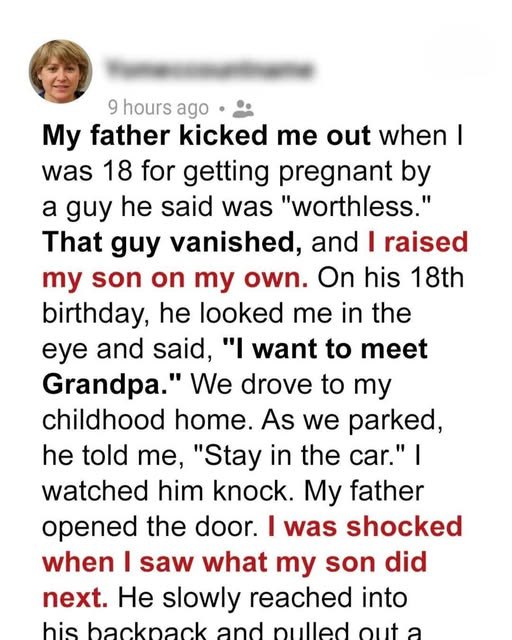At seventeen, I lost everything in one night.
The moment I told my father I was pregnant, his silence said more than words ever could. He didn’t shout or curse—he just opened the door and told me to leave. That was it. Childhood over. Home gone. All I had left was a duffel bag, a heartbeat inside me, and the will to survive. I worked every job I could find, slept little, and whispered promises to the baby I carried. When my son, Liam, was born, it was just us against the world.
We grew up together in that tiny, leaky studio—me stacking shelves, him studying by the hum of the fridge. He never complained. By fifteen, he was fixing cars; by seventeen, customers came looking for “the kid with the golden hands.” He was everything I’d prayed he’d be—steady, kind, and unstoppable. So on his eighteenth birthday, when I asked what he wanted, I expected something simple. Instead, he said, “I want to meet Grandpa.” My heart stopped, but I drove him anyway, back to the house I’d left in tears nearly two decades ago.
My father opened the door, older but still stone-faced. Liam handed him a box. “We can celebrate my birthday together,” he said. Inside was one slice of cake. Then my son looked him in the eye and said, “I forgive you—for what you did to my mom. For what you didn’t do for me.” My father stood frozen, every apology he’d never spoken caught behind his lips. Liam continued, “Next time I knock, it won’t be with cake. I’m opening my own garage. You taught me how to do it alone.” Then he turned, calm and sure, and walked back to the car.
As we drove away, I stared at him—the boy I’d raised into a man who carried grace instead of bitterness. “I forgave him, Mom,” he said quietly. “Maybe it’s your turn.” And in that moment, I understood: what I thought was the end of my story at seventeen had only been the beginning. Pain had built our strength. Rejection had carved our resilience. We weren’t broken—we were proof that love, once rooted deep enough, can grow through anything.
